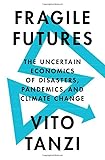Fragile futures:
Material type: TextPublication details: New Delhi: Cambridge University Press, 2022.Description: vi,23pISBN:
TextPublication details: New Delhi: Cambridge University Press, 2022.Description: vi,23pISBN: - 9781009100120
- 330.9001 TAN
 Book
Book
| Item type | Current library | Call number | Status | Date due | Barcode | |
|---|---|---|---|---|---|---|
 Book
Book
|
IIM Kashipur | 330.9001 TAN (Browse shelf(Opens below)) | Available | 11327 |
Includes bibliographical references and index.
"This book revisits a distinction introduced in 1921 by economists Frank Knight and John Maynard Keynes: that between statistically predictable future events ("risks") and statistically unpredictable, uncertain events ("uncertainties"). Governments have generally ignored the latter, perceiving phenomena such as pandemics, natural disasters, and climate change as uncontrollable Acts of God. As a result, there has been little if any preparation for future catastrophes. Our modern society is more interconnected and more globalized than ever. Dealing with uncertain future events requires a stronger and more globally coordinated government response. This book suggests a larger, more global government role in dealing with these disasters and keeping economic inequalities low. Major institutional changes, such as regulating the private sector for the common good and dealing with special harms, risks and crises, especially those concerning climate change and pandemics, are necessary in order to achieve any semblance of future progress for humankind"
There are no comments on this title.

